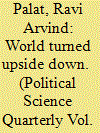| Srl | Item |
| 1 |
ID:
145006


|
|
|
|
|
| Summary/Abstract |
The paper scrutinizes the spillover effects of expansionary monetary policies of a center economy to the macroeconomic policies of periphery countries, dependent on the exchange rate regime. In particular, the impact of the US quantitative easing on the Chinese economy is analysed. The results suggest that the exchange rate regime plays a minor role in insulating the economies at the periphery of the world monetary system from monetary policy shocks in the center. Capital controls, on the other hand, enable the periphery countries, in particular China, to maintain a certain degree of monetary independence in the short run. In the long run, a closer Chinese–European policy coordination is argued to create a counterbalance to the predominance of the US dollar in the currently asymmetric world monetary system. This would provide an incentive to the USA to phase out undue monetary expansion.
|
|
|
|
|
|
|
|
|
|
|
|
|
|
|
|
| 2 |
ID:
121740


|
|
|
|
|
| Publication |
2013.
|
| Summary/Abstract |
Economists have put forward various proposals to deal with the growing risks of the global reserve currency system. In this paper we recommend that Asian economies hold each other's currencies as part of their foreign reserves. Different from crisis-fighting currency swap arrangements or crisis-rescuing fund mechanisms, this mechanism means that reserves would be held, with a regular arrangement in place and on an ongoing basis. We propose that the global reserve system should be pushed in the direction of diversification, which could be a transitional step toward a new single reserve system. This mechanism would not necessitate any currency being a globally accepted reserve currency but would mean that every currency carried some weight in the reserve system. Establishment of such a system would require significant development of regional bond markets and facilitation of macroeconomic surveillance among the economies.
|
|
|
|
|
|
|
|
|
|
|
|
|
|
|
|
| 3 |
ID:
096658


|
|
|
|
|
| Publication |
2010.
|
| Summary/Abstract |
By focusing on the consequences of the dismantling of regulations over the financial sector, the current debate on the causes of the global economic meltdown obscures the cyclical occurrence of speculation in capitalism, as the accumulation of more capital than can be profitably invested in the production and sale of commodities results in financial expansion. Historically financial expansion has signalled the end of one world-scale system of accumulation and the transition to a new system as capital flows from declining powers to rising powers. However, the contemporary period is distinguished by capital flows from rising powers to declining ones. An analysis of the current crisis suggests a reversal of this anomaly as it reduces the ability of China and other East Asian states to support the US dollar. At the same time 'emerging market economies' have begun to forge new relationships that could provide the framework for a new system of partnership between states and enterprises to reconstruct a new cycle of accumulation if two hurdles are overcome: 1) absorption of labour that is being displaced because of the high organic composition of capital and 2) dampening of the growing inequalities in income which has not only restricted the growth of markets but is also fuelling increasing social conflict.
|
|
|
|
|
|
|
|
|
|
|
|
|
|
|
|